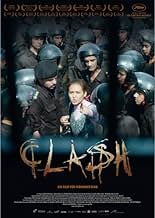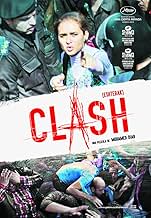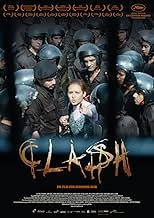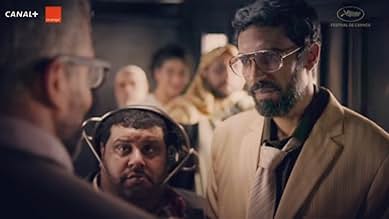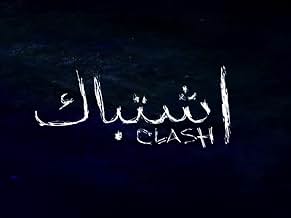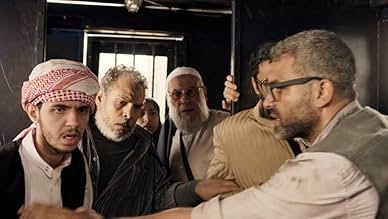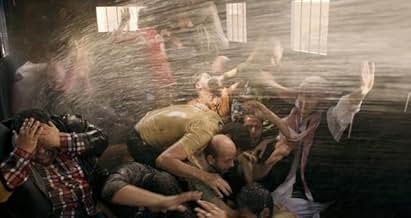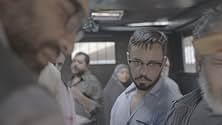IMDb RATING
7.4/10
6.4K
YOUR RATING
Set entirely in an 8m police truck, a number of detainees from different political and social backgrounds are brought together by fate, during the turmoil that followed the ousting of former... Read allSet entirely in an 8m police truck, a number of detainees from different political and social backgrounds are brought together by fate, during the turmoil that followed the ousting of former president Morsi from power.Set entirely in an 8m police truck, a number of detainees from different political and social backgrounds are brought together by fate, during the turmoil that followed the ousting of former president Morsi from power.
- Awards
- 13 wins & 9 nominations total
Muhammad El-Sebai
- Zain
- (as Mohamed El Sebaey)
Mohamed Elsewisy
- Uwais
- (as Mohamed El Souisy)
Ahmad Abdulhamid Hifni
- Awadh
- (as Ahmed Abdel Hamid)
Husni Sheta
- Fishoo
- (as Hosny Sheta)
Dash Ahmed
- Fares
- (as Ahmad Dash)
Gamil Barsoom
- Salah
- (as Gameel Barsoum)
Muhammad Tareq
- Hussein
- (as Mohamed Tarek)
Muhammad Gamal Qalbaz
- Tamer
- (as Mohamed Gamal Kalbaz)
- Director
- Writers
- All cast & crew
- Production, box office & more at IMDbPro
Featured reviews
I appreciate a lot of what this attempts, even if it doesn't always mesh together for a good film.
The acting is more than decent, the cinematography is impressive given the obvious limitations and the story it's attempting to share is compelling. However, I don't think there's enough there for a full-blown film. All the characters have their own story and motives which aren't overly developed, which generally leads to shouting matches every five minutes - which is simply irritating to watch.
I, admittedly, do not know anything close to enough about the Egyptian uprising of 2013, but every character says something or does something that I just find purely nonsensical; to the point where I'm not sure it would even happen in real life. Perhaps I'm wrong, certainly a possibility, though it just comes across that the filmmakers had loads of stories to tell and just crammed them in without making them appear logical.
I still find 'Clash' extremely interesting and admire how it's all filmed and put together, I just feel that the premise wears thin a tad.
The acting is more than decent, the cinematography is impressive given the obvious limitations and the story it's attempting to share is compelling. However, I don't think there's enough there for a full-blown film. All the characters have their own story and motives which aren't overly developed, which generally leads to shouting matches every five minutes - which is simply irritating to watch.
I, admittedly, do not know anything close to enough about the Egyptian uprising of 2013, but every character says something or does something that I just find purely nonsensical; to the point where I'm not sure it would even happen in real life. Perhaps I'm wrong, certainly a possibility, though it just comes across that the filmmakers had loads of stories to tell and just crammed them in without making them appear logical.
I still find 'Clash' extremely interesting and admire how it's all filmed and put together, I just feel that the premise wears thin a tad.
For all of you who don't know, back in the 40's and 50's .. Egypt had one the best movie industries in the world, it was an equal to Hollywood back then .. but as our fellow writer lemony Snicket says due to a series of an unfortunate events, Egyptian cinema went downhill starting from the middle 60's .. there were some exceptions and some great works done by independent filmmakers such as chahine and atef eltayb and mohamed khan .. and yet there was still hope in Egyptian cinema .. but it was all gone starting from the middle 90's .. Very few movies i can recall that was OK in this period till late 2000's ..and then starting from 2010's we saw some real potential in a new generation of filmmakers that can actually restore Egyptian cinema legacy such as Amr salama and Mohamed diab .. and here we have on of the best Egyptian movies in the past two decades and the most thought provoking one.
Clash takes place in only one setting a 8m police truck .. from the beginning .. You would have this Claustropohbia even if you don't have it, Diab wanted to tell us than the true claustrophohia is in our thinking, in the narrow thinking that could end all of us, this movie isn't pointed toward a single audience .. it's a movie about humanity, about how to accept each other even if sometimes we can't stand each other but in order to move forward we have to, and it's done in a beautiful symbolic way .. It also have a political background and it may seem at first that's it's the movie's story but actually no, the political purpose is there i won't deny but it's crafted in a light way that Foreign audience can still watch and enjoy and have the same impact as Egyptian one's ..
The casting was superb, everyone did their job in a stellar, outstanding way .. I won't talk too much about it but it's truly one of the movie's positive sides.
The direction and the cinematography are the ones that truly deserves to raise the hat for, an exceptional work done, and take in recognition the budget of this movie that won't actually exceed two million dollars and maybe even less .. considering the budget of this movie, it's a splendid effort done by the whole crew ..
It's a movie experience in which you'd feel a mixture of emotions, You'd feel for an hour and 36 minutes like you're being trapped with the characters, and ironically it's Egypt's political situation now.
Clash takes place in only one setting a 8m police truck .. from the beginning .. You would have this Claustropohbia even if you don't have it, Diab wanted to tell us than the true claustrophohia is in our thinking, in the narrow thinking that could end all of us, this movie isn't pointed toward a single audience .. it's a movie about humanity, about how to accept each other even if sometimes we can't stand each other but in order to move forward we have to, and it's done in a beautiful symbolic way .. It also have a political background and it may seem at first that's it's the movie's story but actually no, the political purpose is there i won't deny but it's crafted in a light way that Foreign audience can still watch and enjoy and have the same impact as Egyptian one's ..
The casting was superb, everyone did their job in a stellar, outstanding way .. I won't talk too much about it but it's truly one of the movie's positive sides.
The direction and the cinematography are the ones that truly deserves to raise the hat for, an exceptional work done, and take in recognition the budget of this movie that won't actually exceed two million dollars and maybe even less .. considering the budget of this movie, it's a splendid effort done by the whole crew ..
It's a movie experience in which you'd feel a mixture of emotions, You'd feel for an hour and 36 minutes like you're being trapped with the characters, and ironically it's Egypt's political situation now.
The movie opens with a few lines recounting the events that led to the heated rivalry between the Army (& pro-army supporters) and the Muslim Brotherhood (henceforth 'MB'); the camera having set its gaze inside an army truck.
A couple of journalists (who claim to be neutral to both factions) are arrested and brought into the truck. Their attempts at drawing an Anti-MB mob's attention to assist in their escape backfire when the senior reporter is observed to capture the incident on a watch that doubles as a camera. The army is forced to apprehend the mob for pelting stones and lock them inside the truck.
One thing leads to another and before we know it, a bunch of MB supporters are taken into custody and put along with the rest of the detainees in the truck. The situation outside is tense in itself, but imagine supporters of two rickety factions being forced to share a claustrophobic space together. The numbers comprise people not just with different political ideals, but of varied age-groups, religions and genders.
The writing is sensationally solid with lines given to members from both divisions to substantiate their character arcs. But circumstances are such that, eventually, all of them start to wilt and run out of hope (and breath) while stuck inside the van, left undeniably helpless when it comes to saving their own butts before their loved ones'.
The crowd includes individuals who are friends, relatives, acquaintances and even colleagues. Although it might seem a little difficult to follow the names and faces of each of the characters, the writing/direction is sublime enough to collectively grasp the divided opinion. What's astonishing here is how the Diabs even manage to bring in some unexpected comic relief as well in the form of a brilliantly-written scene involving a wannabe actor/singer, that is just a fleeting moment of joy before terror strikes yet again.
Cinematography work (by Ahmed Gabr) is first-rate. Even though shooting within the confined setting of the film must have been strenuous, there are plenty of visuals (and scenes in totality) that stick with the viewer: the adolescent woman who struggles hard to hold nature's calls but seemingly gives in at one point, the aspiring DJ who has had enough of seeing everyone around him riot and settles into his own "happy zone" by listening to music from his phone, the soldier who disobeys orders while delineating his humanitarian side, the reversal of fate for another officer (the list is endless!).
The crafting of the riot scenes taking place outside is magnificently believable and terrifying to perceive. To add to the positives of the film, the climactic finale was indeed difficult to envisage. The tagline of the film says "Conflict is on the Inside" and it reinstates this through a powerful narrative which delves into both political and personal strife. The film rightfully deserves a bigger audience and greater appreciation than it has already been earning.
Verdict: Must-watch!
A couple of journalists (who claim to be neutral to both factions) are arrested and brought into the truck. Their attempts at drawing an Anti-MB mob's attention to assist in their escape backfire when the senior reporter is observed to capture the incident on a watch that doubles as a camera. The army is forced to apprehend the mob for pelting stones and lock them inside the truck.
One thing leads to another and before we know it, a bunch of MB supporters are taken into custody and put along with the rest of the detainees in the truck. The situation outside is tense in itself, but imagine supporters of two rickety factions being forced to share a claustrophobic space together. The numbers comprise people not just with different political ideals, but of varied age-groups, religions and genders.
The writing is sensationally solid with lines given to members from both divisions to substantiate their character arcs. But circumstances are such that, eventually, all of them start to wilt and run out of hope (and breath) while stuck inside the van, left undeniably helpless when it comes to saving their own butts before their loved ones'.
The crowd includes individuals who are friends, relatives, acquaintances and even colleagues. Although it might seem a little difficult to follow the names and faces of each of the characters, the writing/direction is sublime enough to collectively grasp the divided opinion. What's astonishing here is how the Diabs even manage to bring in some unexpected comic relief as well in the form of a brilliantly-written scene involving a wannabe actor/singer, that is just a fleeting moment of joy before terror strikes yet again.
Cinematography work (by Ahmed Gabr) is first-rate. Even though shooting within the confined setting of the film must have been strenuous, there are plenty of visuals (and scenes in totality) that stick with the viewer: the adolescent woman who struggles hard to hold nature's calls but seemingly gives in at one point, the aspiring DJ who has had enough of seeing everyone around him riot and settles into his own "happy zone" by listening to music from his phone, the soldier who disobeys orders while delineating his humanitarian side, the reversal of fate for another officer (the list is endless!).
The crafting of the riot scenes taking place outside is magnificently believable and terrifying to perceive. To add to the positives of the film, the climactic finale was indeed difficult to envisage. The tagline of the film says "Conflict is on the Inside" and it reinstates this through a powerful narrative which delves into both political and personal strife. The film rightfully deserves a bigger audience and greater appreciation than it has already been earning.
Verdict: Must-watch!
Seen at the Filmfest Ghent 2016 (website: http://www.filmfestival.be/en). Prior to the screening, the director told that he succeeded in pissing off everyone in Egypt by making this movie. Arousing that much controversy can be considered a huge success in itself, were it not that he suffered some trauma because of everyone punching him afterwards. Along the line, he was accused of being a spy, funded by the West, even though the film is against no one, just pro humanity in general. Even so remarkable is that the film got attacked by everyone equally, because it inadvertently seemed to humanize "the others".
After Lebanon (2009, Samuel Maoz) this movie extends the concept of the narrow space with a very limited view on the outside world, and no easy way to escape due to a hostile environment. New is that the 25 persons locked up in a police van, are very different from each other with respect to age, religion, politics, and even sexes are mixed with all complications thereof. In other words, the hostility is not only the outside world but comes from fellow prisoners too, maybe even more so from internal rather than external.
For me it was not easy to remember faces and names; I lost track of each one's political stance very soon. Nevertheless, the hodgepodge of people and attitudes is clear from the outset. There is spurious contact with other police vans, containing people in a similar position, with name exchanges to verify whether relatives or friends are kept there and hopefully are in good health. Also, there are frequent contacts with soldiers, sometimes helpful sometimes not so helpful due to orders from higher echelons, or flatly unhelpful because of uncertainty about the other side's intentions.
The Q&A with the director after the screening brought a lot of useful information, in fact an addendum to his initial address before the screening. I scribbled down the following notes. It is difficult to make a movie like this in contemporary Egypt. A self-contained movie could be made about the making of this one, or even around making movies in general in Egypt for that matter. And it can still be worse, when seeing the film being pulled off cinema listings after its official release. On the other hand, he received moral support from outside Egypt, like for example Tom Hanks, who wrote that this movie changed his view on Egypt. Following up on a question from the audience, about being still welcome in Egypt, the director replied that it is complicated. In any case, it is still unclear whether he could make any other film there. It is not that that some person or some bureaucracy is against, because of Egypt being so many things together and certainly no homogeneous mass. Another question from the audience about the humor that was prominently present, despite the subject matter being a very serious matter. The director replied that the humor was interwoven to breathe, something that is very common in Egypt, often observed even during funerals.
After Lebanon (2009, Samuel Maoz) this movie extends the concept of the narrow space with a very limited view on the outside world, and no easy way to escape due to a hostile environment. New is that the 25 persons locked up in a police van, are very different from each other with respect to age, religion, politics, and even sexes are mixed with all complications thereof. In other words, the hostility is not only the outside world but comes from fellow prisoners too, maybe even more so from internal rather than external.
For me it was not easy to remember faces and names; I lost track of each one's political stance very soon. Nevertheless, the hodgepodge of people and attitudes is clear from the outset. There is spurious contact with other police vans, containing people in a similar position, with name exchanges to verify whether relatives or friends are kept there and hopefully are in good health. Also, there are frequent contacts with soldiers, sometimes helpful sometimes not so helpful due to orders from higher echelons, or flatly unhelpful because of uncertainty about the other side's intentions.
The Q&A with the director after the screening brought a lot of useful information, in fact an addendum to his initial address before the screening. I scribbled down the following notes. It is difficult to make a movie like this in contemporary Egypt. A self-contained movie could be made about the making of this one, or even around making movies in general in Egypt for that matter. And it can still be worse, when seeing the film being pulled off cinema listings after its official release. On the other hand, he received moral support from outside Egypt, like for example Tom Hanks, who wrote that this movie changed his view on Egypt. Following up on a question from the audience, about being still welcome in Egypt, the director replied that it is complicated. In any case, it is still unclear whether he could make any other film there. It is not that that some person or some bureaucracy is against, because of Egypt being so many things together and certainly no homogeneous mass. Another question from the audience about the humor that was prominently present, despite the subject matter being a very serious matter. The director replied that the humor was interwoven to breathe, something that is very common in Egypt, often observed even during funerals.
There has been much anticipation and controversy preceding the theatrical release in Egypt with several rumors that it will get censored on not released at all and a reporter on National TV called the director a "traitor" and an "anarchist who only focuses on the bad aspects of Egyptian society to capitalize on them." But although it's the most political film to be released in Egypt after the revolution ,in a market dominated mostly by comedies and Hollywood blockbusters, it comes off as mostly apolitical.
Clash is the second feature film for writer/director Mohamed Diab taking place in early July 2013 after president Mohamed Morsi was overthrown by the army and many people took off to the streets either to celebrate or protest. Starting in an empty police car of about eight meters square which soon gets filled with different people arrested in the protests ranging from an American/Egyptian reporter to revolutionaries and Muslim Brotherhood supporters to a group of young men who had nothing to do with it all except that they happened to be walking by.
Tensions arise and we start to see the sheep mentality of both the Muslim Brotherhood members who only talk to each other and refuse to stand next to the others and that of the policemen who refuse to giver the arrested water as they were not "ordered" to.
But the movie doesn't focus on their political affiliations and portrays them as only humans. We see the revolutionary nurse helping a wounded M.B member. They sing, they share their memories during the Arab Spring revolution. The short running time may not allow to dig deeper into the characters but I believe it focuses on living the experience by confining our POV inside the car during the whole movie making us feel as hopeless and suffocated as those trapped who aren't even allowed to pee and instead are shown how to do it in a bottle.
The dialogue sometimes seems a little childish and some things felt like they were thrown in just to increase the running time as the argument between Mans and his friend who found out that Mans is sending romantic messages to the his sister.
The clash scenes between the police and the protesters were masterful and showing them only through the car windows makes them seem even more colossal giving a real feeling of the chaos. The ending was cinematically beautiful with the green lasers all over the place. Although the ending may seem a little unsatisfying to some (including me at first), I think it's the perfect reflection of the current thinking in Egypt.
After The Revolution in 2011 during the Arab Spring, everyone, especially the youth, started thinking of his own utopia and were looking forward to a "New Egypt" only to see their dreams evaporate as they saw the same mistakes being repeated again, their political leaders betraying them, giving them only false promises and sweet talk. As I am writing this now, the economy is at its lowest with the rich/poor gap widening gradually, the budget for health and education dwindling, the political arena is filled with the same faces or new faces with the same mindset of the old regime. Censorship touches everything and there have even been talks to censor the Social media. so you can't really blame them for losing hope and abandoning their dreams and not seeing the light at the end of the tunnel. For them there is only darkness-nothing else.
Clash is the second feature film for writer/director Mohamed Diab taking place in early July 2013 after president Mohamed Morsi was overthrown by the army and many people took off to the streets either to celebrate or protest. Starting in an empty police car of about eight meters square which soon gets filled with different people arrested in the protests ranging from an American/Egyptian reporter to revolutionaries and Muslim Brotherhood supporters to a group of young men who had nothing to do with it all except that they happened to be walking by.
Tensions arise and we start to see the sheep mentality of both the Muslim Brotherhood members who only talk to each other and refuse to stand next to the others and that of the policemen who refuse to giver the arrested water as they were not "ordered" to.
But the movie doesn't focus on their political affiliations and portrays them as only humans. We see the revolutionary nurse helping a wounded M.B member. They sing, they share their memories during the Arab Spring revolution. The short running time may not allow to dig deeper into the characters but I believe it focuses on living the experience by confining our POV inside the car during the whole movie making us feel as hopeless and suffocated as those trapped who aren't even allowed to pee and instead are shown how to do it in a bottle.
The dialogue sometimes seems a little childish and some things felt like they were thrown in just to increase the running time as the argument between Mans and his friend who found out that Mans is sending romantic messages to the his sister.
The clash scenes between the police and the protesters were masterful and showing them only through the car windows makes them seem even more colossal giving a real feeling of the chaos. The ending was cinematically beautiful with the green lasers all over the place. Although the ending may seem a little unsatisfying to some (including me at first), I think it's the perfect reflection of the current thinking in Egypt.
After The Revolution in 2011 during the Arab Spring, everyone, especially the youth, started thinking of his own utopia and were looking forward to a "New Egypt" only to see their dreams evaporate as they saw the same mistakes being repeated again, their political leaders betraying them, giving them only false promises and sweet talk. As I am writing this now, the economy is at its lowest with the rich/poor gap widening gradually, the budget for health and education dwindling, the political arena is filled with the same faces or new faces with the same mindset of the old regime. Censorship touches everything and there have even been talks to censor the Social media. so you can't really blame them for losing hope and abandoning their dreams and not seeing the light at the end of the tunnel. For them there is only darkness-nothing else.
Did you know
- TriviaDirector Mohamed Diab received a message from actor Tom Hanks thanking him for the movie. Hanks said that the film should change the way the West looks at democracy and politics in the Middle East.
- ConnectionsReferenced in Marvel Studios: Assembled: The Making of Moon Knight (2022)
- How long is Clash?Powered by Alexa
Details
Box office
- Gross US & Canada
- $18,215
- Gross worldwide
- $143,121
- Runtime
- 1h 37m(97 min)
- Color
- Aspect ratio
- 1.85 : 1
Contribute to this page
Suggest an edit or add missing content


